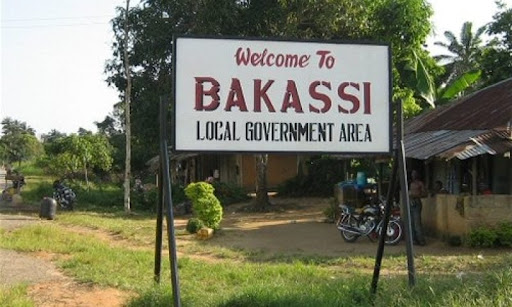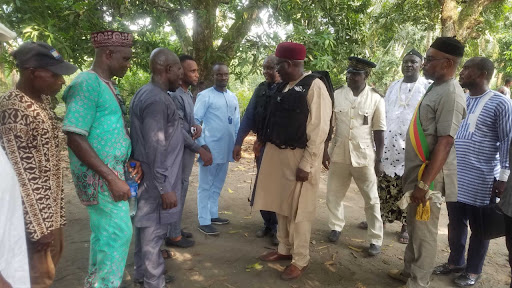Nigerians In Bakassi Need To Pay Tax If They Want Services, Says Gov’t
Nigerians living in the Bakassi Peninsula, now part of Cameroon, have complained that they feel sidelined and deprived of basic services. The Cameroonian authorities have a simple answer; “pay your tax”.

Nigerian citizens living in a border region of Cameroon that used to be part of neighbouring Nigeria, have complained they are denied basic services, and are being sidelined.
But Cameroonian officials say there is a reason for the lack of development; Nigerians haven’t been paying their taxes.
During an official visit to the Bakassi Peninsula by the Consul General of the Federal Republic of Nigeria to the Northwest and Southwest Cameroon, Nigerians voiced their complaint that they lack drinkable water, amongst other infrastructure.
After years of occasionally bloody border conflict, the International Court of Justice transferred the sovereignty of the Bakassi peninsula from Nigeria to Cameroon on Aug. 14, 2008.
The riverine peninsula that juts out into the Gulf of Guinea is mostly inhabited by the Oron people, who also inhabit Cross River and Akwa Ibom states in Nigeria.

The two-day trip to Bakassi enabled Consul-General Bappah Lawal to meet Nigerians living in Kombo Itindi, Bamusso and Idabatu.
While applauding the harmonious relationship between his people and host communities, the President of the Nigerian Union in Bekumu, Bamusso subdivision, Manga Joseph Wilson, said the Nigerian communities felt that they were being unfairly treated.
Local authorities, however, said the failure to contribute to the cost of providing the services they demanded was to blame.
The Divisional Officer of Idabatu, Ewane Roland insisted they can’t develop their communities if Nigerians continue to evade taxes.
“I think that they will now understand, because you cannot live in a place without paying allegiance to that place”, he said. “Without paying taxes, you come, reap from the place, harvest and go without paying taxes. Everybody has the right to pay taxes, that is what the government needs to develop.”
He said he believes the visit of the Consul General will serve as an eye-opener to the people.
Late fees
For the Nigerians, Manga Joseph Wilson pleaded with local administrators to change the time of year that the taxes were collected.
From December to February, most Nigerians cross the border to visit their family for Christmas.
If they collected tax in March, instead of January, they would receive more, he said.
Wilson said many people who did pay their taxes had to pay more late fees because they were away when the collectors came.
The Mayor of Bamusso, Samuel Meme, said they needed good relations with Nigerians living in Bakassi. “We cannot succeed in our administration without working with Nigerians. So for us to have a harmonious breakthrough in our administration, we need to accommodate the Nigerian population.”
At least 17,000 people live in the area visited by the Consul General. As many as 15,500 of them are Nigerian citizens.
A simmering conflict between the two neighbouring states over the peninsula had been going on since both gained independence in 1960. The region is thought to have untapped fields of gas and oil.
It is today made up of five subdivisions; Isangele, Kombo Abedimo, Kombo Itindi, Idabato and Bamusso. Since Cameroon effectively took over administration in 2013, Nigerians have on numerous occasions complained of poor treatment from local authorities.
Naira scarcity
There has been another pressure on the community this year.
Though governed by Cameroon, the Naira currency is mostly used in these localities, in preference to CFA Francs. Nigerian traders are facing challenges with the scarcity of Naira, a situation that is affecting the rest of their neighbouring homeland.
Meme, the Mayor of Bamusso, says this has greatly affected the economy.
“We are more familiar with Naira in this community,” Meme said, “looking at the current situation, business and economy has crumbled.”
“This, however, stalls development,” he added.
This year, authorities postponed tax collections on the understanding that they will resume when cash becomes more available.
The country is experiencing a shortage of banknotes after the Central Bank of Nigeria started swapping old bills of the local currency to new ones.
Despite everything raised by his people, the Consul General said he wanted his visit to the area to strengthen the bond between Nigerians and host communities, while encouraging his people to live harmoniously with Cameroonians.
“From time to time, it is imperative on our own part to make sure we interact with both sides in order to improve the harmonious coexistence between the two communities”, said the Consul General, who wore a protective vest during his visit, in case someone tried to stab him.
Lawal assured Nigerians the basic problems faced by the people will be handled by local administrators in the area.
Support Our Journalism
There are millions of ordinary people affected by conflict in Africa whose stories are missing in the mainstream media. HumAngle is determined to tell those challenging and under-reported stories, hoping that the people impacted by these conflicts will find the safety and security they deserve.
To ensure that we continue to provide public service coverage, we have a small favour to ask you. We want you to be part of our journalistic endeavour by contributing a token to us.
Your donation will further promote a robust, free, and independent media.
Donate HereStay Closer To The Stories That Matter




